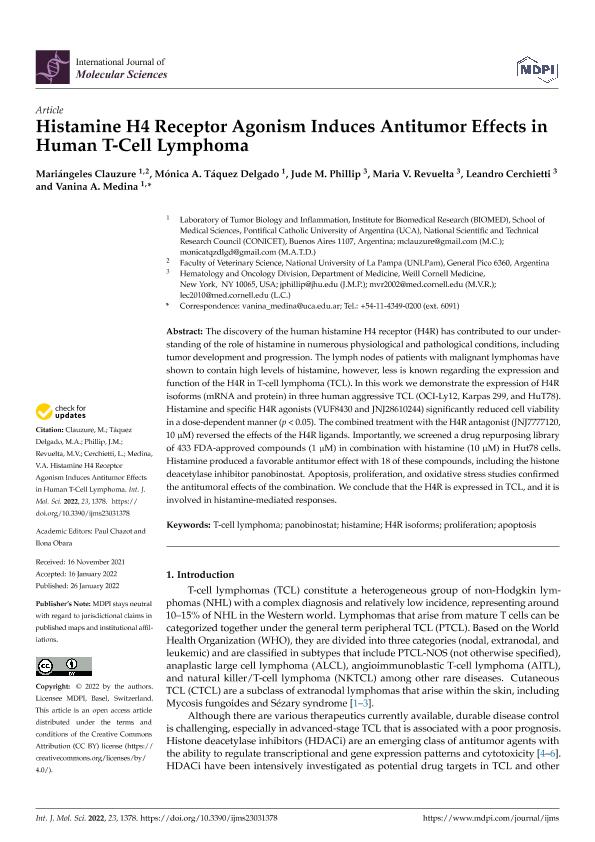Artículo
Histamine H4 Receptor Agonism Induces Antitumor Effects in Human T-Cell Lymphoma
Clauzure, Mariangeles ; Táquez Delgado, Mónica Alejandra
; Táquez Delgado, Mónica Alejandra ; Phillip, Jude M.; Revuelta, María Victoria
; Phillip, Jude M.; Revuelta, María Victoria ; Cerchietti, Leandro
; Cerchietti, Leandro ; Medina, Vanina Araceli
; Medina, Vanina Araceli
 ; Táquez Delgado, Mónica Alejandra
; Táquez Delgado, Mónica Alejandra ; Phillip, Jude M.; Revuelta, María Victoria
; Phillip, Jude M.; Revuelta, María Victoria ; Cerchietti, Leandro
; Cerchietti, Leandro ; Medina, Vanina Araceli
; Medina, Vanina Araceli
Fecha de publicación:
02/2022
Editorial:
Multidisciplinary Digital Publishing Institute
Revista:
International Journal of Molecular Sciences
ISSN:
1661-6596
e-ISSN:
1422-0067
Idioma:
Inglés
Tipo de recurso:
Artículo publicado
Clasificación temática:
Resumen
The discovery of the human histamine H4 receptor (H4R) has contributed to our understanding of the role of histamine in numerous physiological and pathological conditions, including tumor development and progression. The lymph nodes of patients with malignant lymphomas have shown to contain high levels of histamine, however, less is known regarding the expression and function of the H4R in T-cell lymphoma (TCL). In this work we demonstrate the expression of H4R isoforms (mRNA and protein) in three human aggressive TCL (OCI-Ly12, Karpas 299, and HuT78). Histamine and specific H4R agonists (VUF8430 and JNJ28610244) significantly reduced cell viability in a dose-dependent manner (p < 0.05). The combined treatment with the H4R antagonist (JNJ7777120, 10 µM) reversed the effects of the H4R ligands. Importantly, we screened a drug repurposing library of 433 FDA-approved compounds (1 µM) in combination with histamine (10 µM) in Hut78 cells. Histamine produced a favorable antitumor effect with 18 of these compounds, including the histone deacetylase inhibitor panobinostat. Apoptosis, proliferation, and oxidative stress studies confirmed the antitumoral effects of the combination. We conclude that the H4R is expressed in TCL, and it is involved in histamine-mediated responses.
Palabras clave:
APOPTOSIS
,
H4R ISOFORMS
,
HISTAMINE
,
PANOBINOSTAT
,
PROLIFERATION
,
T-CELL LYMPHOMA
Archivos asociados
Licencia
Identificadores
Colecciones
Articulos(BIOMED)
Articulos de INSTITUTO DE INVESTIGACIONES BIOMEDICAS
Articulos de INSTITUTO DE INVESTIGACIONES BIOMEDICAS
Citación
Clauzure, Mariangeles; Táquez Delgado, Mónica Alejandra; Phillip, Jude M.; Revuelta, María Victoria; Cerchietti, Leandro; et al.; Histamine H4 Receptor Agonism Induces Antitumor Effects in Human T-Cell Lymphoma; Multidisciplinary Digital Publishing Institute; International Journal of Molecular Sciences; 23; 3; 2-2022; 1-15
Compartir
Altmétricas



